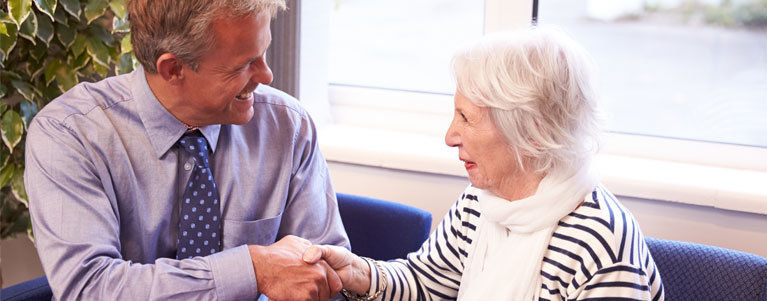Communication Tips for the Hard of Hearing
Whether you wear a hearing aid or not, there are several things you can do to improve your ability to communicate with other people. Following are some useful tips:
What should I do about background noise?
Whenever possible, try to reduce background noise. This will help you to hear speakers more clearly with the least amount of strain. You may wish to:
- Ask to be seated in the quiet part of a restaurant
- Sit next to the wall
- Sit away from the kitchen or heavy traffic area
- Turn down the TV when having a conversation
Is lip reading useful?
Yes! While many do not have formal training in lip reading, looking at the faces of those with whom you are speaking can enable you to see many important cues. Watch for facial expressions and gestures that will provide information about the speaker’s mood. Your eyes will help fill in the part of the message you cannot hear clearly. Try to communicate in well-lit areas so you can see the speaker’s face clearly. If glasses are needed, make sure they are worn.
It also helps to know the topic of conversation. If you can pick up a few words in each sentence, you may be able to fill in the blanks. When you become “lost” in group conversations, try to concentrate on one person who seems to be assuming the majority of the dialogue.
You will have more difficulty with lip reading if speakers have a cigarette, pipe, or food in their mouth, or if their hands are covering their mouths. Do not be afraid to politely ask for them to remove it so you can understand them clearly.
Where should I sit in public speaking events or theaters?
In public-speaking situations or places of worship, try to sit in the front of the room or near the loudspeakers. If one ear is better than the other, sit with your better ear facing the speaker. Many theaters and other venues now have assistive listening devices available that are very helpful. Ask an usher, manager, or box office employee. With an assistive listening device, you will be able to adjust the volume for your specific hearing loss. In these instances, an assistive listening device may be more helpful than your hearing aids. Large public venues, especially theatres and large churches, may have an electromagnetic system that is compatible with certain types of hearing aids. Please ask your audiologist if your hearing aids have this feature.
Are there any other things I should consider?
If you cannot understand what is being said to you, ask the speaker to rephrase, rather than just repeat, the message. You can also paraphrase the parts of the message that you actually heard instead of only saying “what”.
Try to relax while you are speaking with others. While it may be challenging to relax, if you are tense or even trying too hard, it becomes more difficult to understand speech.
Be sure to let your family know how they can help you by asking them to:
- Speak in a normal tone of voice
- Avoid over-articulating their words
- Look directly at you when speaking.
- Avoid speaking to you from another room.
- Rephrase messages if needed
Are there organizations in Raleigh that can help me?
Yes, one of these organization is the Hearing Loss Association of America. The website for North Carolina chapters of HLAA can be found here: www.hearingloss.org. The HLAA opens the world of communication to people with hearing loss by providing information, education, support and advocacy. There are over 250 chapters throughout the United States, including chapters in Wake Forest and Winston – Salem.
The goals of HLAA meetings are:
Education: Promoting understanding of the nature, causes, complications, and remedies of hearing loss. Advocacy: Promoting new technology, medical research, and legislation that will alleviate the effects of hearing loss. Self Help: Promoting self-confidence; empower individuals with skills to improve their lives; and providing interaction among people with hearing loss, their friends, families, and professionals.
Wake County HLAA Chapter meets one Thursday a month
For more information, contact:
Janet McGettrick
919.469.0924
jmcgettrick@nc.rr.com
Steve Barber
steve.barber@earthlink.net

